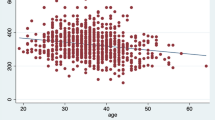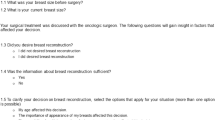Abstract
Background
Breast reconstruction is associated with improved patient well-being after mastectomy; however, factors that contribute to post-surgical dissatisfaction remain poorly characterized.
Methods
Adult women who underwent post-mastectomy implant-based or autologous breast reconstruction between 2015 and 2019 were recruited to participate in semi-structured interviews regarding their lived experiences with reconstructive care. Participants completed the BREAST-Q, and tabulated scores were used to dichotomize patient-reported outcomes as satisfied or dissatisfied (high or low) for each BREAST-Q domain. A convergent mixed-methods analysis was used to evaluate interviews for content related to satisfaction or dissatisfaction with breast reconstruction.
Results
Overall, we interviewed 21 women and identified 17 subcodes that corresponded with the five BREAST-Q domains. Sources of dissatisfaction were found to be related to the following domains: (a) low breast satisfaction due to asymmetry, cup size, and lack of sensation and physical feeling (n = 8, 38%); (b) poor sexual well-being due to shape, look and feel (n = 7, 78% [of 9 who discussed sexual well-being]); (c) reduced physical well-being of the chest due to persistent pain and weakness (n = 11, 52%); (d) reduced abdominal well-being due to changes in abdominal strength, numbness, and posture (n = 6, 38% [of 16 who underwent abdominally based reconstruction]); and (e) low psychosocial well-being impacted by an unexpected appearance that negatively influenced self-confidence and self-identity (n = 13, 62%).
Conclusion
Patients may be unprepared for the physical, sexual, and psychosocial outcomes of breast reconstruction. Targeted strategies to improve preoperative education and shared decision making are needed to mitigate unexpectedness associated with breast reconstruction and related outcomes.
Similar content being viewed by others
Change history
13 September 2021
A Correction to this paper has been published: https://doi.org/10.1245/s10434-021-10796-3
References
Rebecca L, Siegel M, Cancer Statistics (2021) Available at: https://www.cancer.org/content/dam/cancer-org/research/cancer-facts-and-statistics/annual-cancer-facts-and-figures/2021/cancer-facts-and-figures-2021.pdf. Accessed 12 Jan 2021
Platt J, Baxter N, Zhong T. Breast reconstruction after mastectomy for breast cancer. Cmaj. 2011;183(18):2109–16.
Morrow M, Li Y, Alderman AK, et al. Access to breast reconstruction after mastectomy and patient perspectives on reconstruction decision making. JAMA Surg. 2014;149(10):1015–21.
Zhong T, Hu J, Bagher S, et al. Decision regret following breast reconstruction: the role of self-efficacy and satisfaction with information in the preoperative period. Plast Reconstr Surg. 2013;132(5):724e-e734.
Nelson JA, Allen RJ Jr, Polanco T, et al. Long-term patient-reported outcomes following postmastectomy breast reconstruction: an 8-year examination of 3268 patients. Annal Surg. 2019;270(3):473–83.
Eltahir Y, Krabbe-Timmerman IS, Sadok N, Werker PMN, de Bock GH. Outcome of quality of life for women undergoing autologous versus alloplastic breast reconstruction following mastectomy: a systematic review and meta-analysis. Plast Reconstr Surg. 2020;145(5):1109–23.
Eltahir Y, Werners LL, Dreise MM, et al. Quality-of-life outcomes between mastectomy alone and breast reconstruction: comparison of patient-reported BREAST-Q and other health-related quality-of-life measures. Plast Reconstr Surg. 2013;132(2):201e-e209.
Panchal H, Matros E. Current Trends in Postmastectomy Breast Reconstruction. Plast Reconstr Surg. 2017;140:7s–13s.
Albornoz CR, Bach PB, Mehrara BJ, et al. A paradigm shift in US Breast reconstruction increasing implant rates. Plast Reconstr Surg. 2013;131(1):15–23.
Sheehan J, Sherman KA, Lam T, Boyages J. Association of information satisfaction, psychological distress and monitoring coping style with post-decision regret following breast reconstruction. Psycho-Oncol. 2007;16(4):342–51.
Lee CN, Ubel PA, Deal AM, et al. how informed is the decision about breast reconstruction after mastectomy? a prospective cross-sectional study. Annal Surg. 2016;264(6):1103–9.
Lee C, Pignone M, Deal AM, et al. Accuracy of predictions of patients with breast cancer of future well-being after immediate breast reconstruction. JAMA Surg. 2018;153(4):e176112.
Manne SL, Topham N, D’Agostino TA, et al. Acceptability and pilot efficacy trial of a web-based breast reconstruction decision support aid for women considering mastectomy. Psycho-Oncol. 2016;25(12):1424–33.
Soon PS, Ruban S, Mo HTJ, et al. Understanding patient choices regarding breast reconstruction after mastectomy for breast cancer. Support Care Cancer. 2019;27(6):2135–42.
Lee C, Deal AM, Huh R, et al. Quality of patient decisions about breast reconstruction after mastectomy. JAMA Surg. 2017;152(8):741–8.
Flitcroft K, Brennan M, Spillane A. Decisional regret and choice of breast reconstruction following mastectomy for breast cancer: a systematic review. Psycho-Oncol. 2018;27(4):1110–20.
Dossett LA, Kaji AH, Dimick JB. Practical guide to mixed methods. JAMA Surg. 2020;155(3):254–5.
Willis GB. Cognitive interviewing: a tool for improving questionnaire design. Sage Publications; 2004.
Oshima SM, Tait SD, Fish L, Greenup RA, Grimm LJ. Primary care provider perspectives on screening mammography in older women: a qualitative study. Prev Med Rep. 2021;22:101380.
Schwarze ML, Kaji AH, Ghaferi AA. Practical guide to qualitative analysis. JAMA Surg. 2020;155(3):252–3.
Harris PA, Taylor R, Thielke R, Payne J, Gonzalez N, Conde JG. Research electronic data capture (REDCap): a metadata-driven methodology and workflow process for providing translational research informatics support. J Biomed Inf. 2009;42(2):377–81.
Pusic AL, Klassen AF, Scott AM, Klok JA, Cordeiro PG, Cano SJ. Development of a new patient-reported outcome measure for breast surgery: the BREAST-Q. Plast Reconstr Surg. 2009;124(2):345–53.
Mundy LR, Homa K, Klassen AF, Pusic AL, Kerrigan CL. Breast cancer and reconstruction: normative data for interpreting the BREAST-Q. Plast Reconstr Surg. 2017;139(5):1046e-e1055.
Gale NK, Heath G, Cameron E, Rashid S, Redwood S. Using the framework method for the analysis of qualitative data in multi-disciplinary health research. BMC Med Res Methodol. 2013;13:117.
Flitcroft K, Brennan M, Spillane A. Making decisions about breast reconstruction: a systematic review of patient-reported factors influencing choice. Qual Life Res. 2017;26(9):2287–319.
Stone JP, Bello RJ, Siotos C, et al. Patient-related risk factors for worsened abdominal well-being after autologous breast reconstruction. Plast Reconstr Surg. 2020;145(3):475e-e480.
Zhong T, Hu J, Bagher S, et al. A comparison of psychological response, body image, sexuality, and quality of life between immediate and delayed autologous tissue breast reconstruction: a prospective long-term outcome study. Plast Reconstr Surg. 2016;138(4):772–80.
Zainal NZ, Nik-Jaafar NR, Baharudin A, Sabki ZA, Ng CG. Prevalence of depression in breast cancer survivors: a systematic review of observational studies. Asian Pac J Cancer Prev. 2013;14(4):2649–56.
Fatiregun OA, Olagunju AT, Erinfolami AR, Fatiregun OA, Arogunmati OA, Adeyemi JD. Anxiety disorders in breast cancer: prevalence, types, and determinants. J Psychosoc Oncol. 2016;34(5):432–47.
Karakoyun-Celik O, Gorken I, Sahin S, Orcin E, Alanyali H, Kinay M. Depression and anxiety levels in woman under follow-up for breast cancer: relationship to coping with cancer and quality of life. Med Oncol. 2010;27(1):108–13.
Andersen BL, Yang HC, Farrar WB, et al. Psychologic intervention improves survival for breast cancer patients: a randomized clinical trial. Cancer. 2008;113(12):3450–8.
Lee CN, Belkora J, Chang Y, Moy B, Partridge A, Sepucha K. Are patients making high-quality decisions about breast reconstruction after mastectomy? Plast Reconstr Surg. 2011;127(1):18–26.
Drageset S, Lindstrøm TC, Giske T, Underlid K. Women’s experiences of social support during the first year following primary breast cancer surgery. Scand J Caring Sci. 2016;30(2):340–8.
Spector D, Mayer DK, Knafl K, Pusic A. Not what I expected: informational needs of women undergoing breast surgery. Plast Surg Nurs. 2010;30(2):70–4.
Carr TL, Groot G, Cochran D, Vancoughnett M, Holtslander L. Exploring women’s support needs after breast reconstruction surgery: a qualitative study. Cancer Nurs. 2019;42(2):E1-e9.
Oshima Lee E, Emanuel EJ. Shared decision making to improve care and reduce costs. New Engl J Med. 2013;368(1):6–8.
Baker R, Bateman I, Donaldson C, et al. Weighting and valuing quality-adjusted life-years using stated preference methods: preliminary results from the Social Value of a QALY project. Health Technol Assess. 2010;14(27):1–62.
Rose JM, Collins A, Bliemer M, Hensher DA (2009) Ngene 1.0 stated choice experiment design software. University of Sydney
Acknowledgments
This project was supported by a pilot grant from the Plastic Surgery Foundation.
Funding
This study was supported by a pilot grant from the Plastic Surgery Foundation.
Author information
Authors and Affiliations
Corresponding author
Ethics declarations
Disclosure
Scott Hollenbeck is a co-founder of inSoma Bio, a consultant for True Digital Surgery, and has received book royalties from Elsevier. Ronnie L. Shammas, Laura J. Fish, Amanda R. Sergesketter, Anaeze C. Offodile II, Brett T. Phillips, Sachi Oshima, Clara N. Lee, and Rachel A. Greenup have no conflicts of interest to declare.
Additional information
Publisher's Note
Springer Nature remains neutral with regard to jurisdictional claims in published maps and institutional affiliations.
The original online version of this article was revised: Amanda R. Sergesketter′s and Anaeze C. Offodile II′s names were corrected.
Rights and permissions
About this article
Cite this article
Shammas, R.L., Fish, L.J., Sergesketter, A.R. et al. Dissatisfaction After Post-Mastectomy Breast Reconstruction: A Mixed-Methods Study. Ann Surg Oncol 29, 1109–1119 (2022). https://doi.org/10.1245/s10434-021-10720-9
Received:
Accepted:
Published:
Issue Date:
DOI: https://doi.org/10.1245/s10434-021-10720-9




